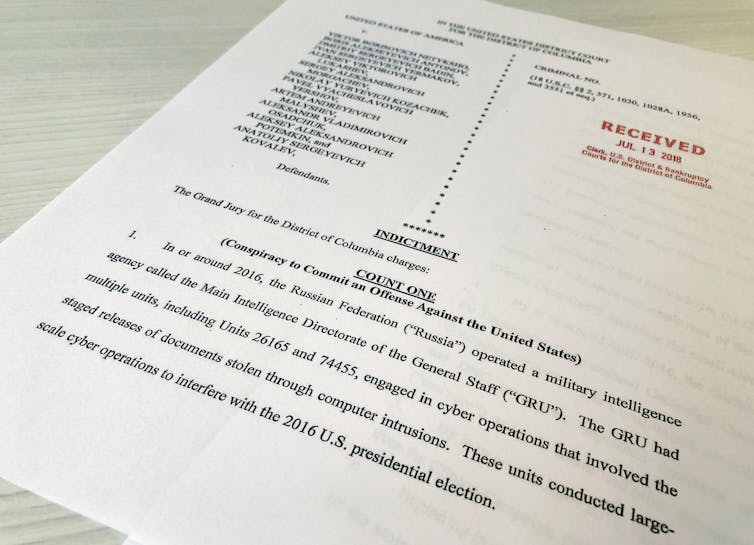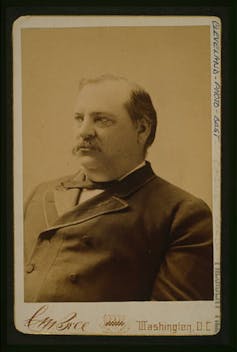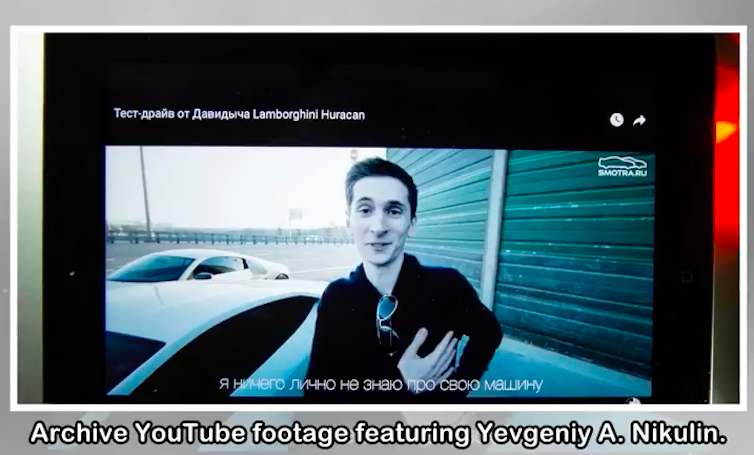If the 12 indicted Russians never face trial in the US, can anything be gained?
- Written by Joel Samuels, Professor of Law, University of South Carolina
During the Cold War, the Soviet Union and the United States regularly exchanged accusations of espionage. The prototypical image of Cold War spies is etched in the minds of anyone who lived through that period or watched its movies – trenchcoat-wearing, “Spy vs. Spy”[1] caricatures exchanging packages in dark alleys.
Modern-day espionage has a different image. Instead of a grizzled Cold Warrior, we picture millennials behind a computer screen hacking government agencies[2], state election systems[3], military contractors[4], social network behemoths[5] and – as alleged[6] last week – major political parties.
On Friday, the Department of Justice announced the indictments[7] of 12 Russian nationals for hacking into emails and servers of the Democratic National Committee, party functionaries and state election officials as part of the investigation into interference with the 2016 U.S. presidential election.
As an expert on U.S.-Russian relations and the international rule of law[8], I believe the indictments are an important step in the effort to establish what happened in the months leading up to the 2016 U.S. presidential election.
 The indictment of 12 Russians.
Reuters/Jim Bourg
The indictment of 12 Russians.
Reuters/Jim Bourg
Democracy functions best when efforts to undermine it are brought into the open. Individual facts, when confirmed, become pieces to a puzzle that fit together to tell a story. In the end, even if the 12 Russians are never tried in the United States and this particular story cannot be uncovered fully, the example these indictments set will provide a road map for other countries facing similar challenges to their democracy.
But that positive example may be little solace for Americans who will feel frustrated if the facts behind Russia’s alleged role in election disruption are not fully uncovered.
Extradition unlikely
At the time of the alleged crimes, all 12 indicted individuals were employed by the GRU[9], the main intelligence agency for the Russian military and a Soviet-era remnant. They live and work in Russia.
Despite President Vladimir Putin’s promises to review the situation, no one expects that Russia will extradite the accused individuals. After all, if the indictments are true, those individuals were working for the Russian government when they committed the alleged crimes[10].
We have seen this very issue arise before, notably after Edward Snowden fled to Moscow in 2013[11]. The United States accused Snowden of espionage and sought his extradition.
Russia refused[12], saying vaguely that Russia did not have grounds to arrest him.
The United States has similarly refused to extradite individuals to Russia, most recently Ilyas Akhmadov, a Chechen rebel leader[13] who was accused by Russia of terrorism and subsequently granted asylum in the United States in 2004.
So the tenuous path to extradition runs in both directions.
Russia is not legally bound to extradite any of the 12 men who were indicted. Indeed, there is some question whether the United States and Russia have an extradition treaty at all.
In 1893, the Senate ratified an extradition treaty with the Emperor of Russia[14]. President Grover Cleveland signed it into law. But by 1974, the U.S. State Department called the treaty “obsolete[15].”
 President Grover Cleveland signed an extradition treaty with Russia in 1893.
Library of Congress
President Grover Cleveland signed an extradition treaty with Russia in 1893.
Library of Congress
Even if the 1893 treaty is still in force, one provision states that both the United States and Russia “shall not be required to deliver up their own citizens or subjects.”
So the treaty would only apply to foreign nationals located in one of the two states – for example, to Germans in Russia, but not to Russians in Russia. In short, Russia will not be bound by the treaty to turn over any of the men indicted on Friday.
Getting to the truth
If the 12 men are unlikely to be extradited by Russia, there won’t be a trial for them in the United States.
What does this mean for establishing the truth of what happened from March through November 2016?
As the indictment itself makes clear, the Mueller investigation has already turned up a number of specific details outlining the source of hacks of both the DNC and accounts of prominent individuals in the Democratic Party[16].
As someone who has been involved in litigation for more than 20 years, I believe that the public dissemination of the indictments may lead to other sources who can verify the underlying alleged facts. It is in the nature of complex criminal investigations to seek indictments on many fronts[17] in the hopes of putting pressure on as many individuals as possible, knowing that not all indictments will lead to prosecution.
Failure to secure convictions or pleas will not be a sign of failure of the indictments. Instead, it can be used to put pressure elsewhere in the investigation that may lead to new information about what happened.
There are a couple of additional ways the truth may come out. All 12 of the individuals who were indicted will now face severe travel restrictions. The United States is likely to place them on the Interpol wanted list[18], and they would be subject to arrest and potential extradition if detained outside of Russia.
In a parallel case that involved the hacking of more than 100 million LinkedIn accounts, the United States successfully secured the extradition of a Russian hacker[19] whom the Russian government had sought to protect from extradition. Indicted in 2016, that hacker, Yevgeniy Nikulin[20], was arrested in the Czech Republic on an international arrest warrant and extradited to the United States[21] in March of this year.
 Screenshot from YouTube of Russian hacker Yevgeniy Nikulin.
YouTube
Screenshot from YouTube of Russian hacker Yevgeniy Nikulin.
YouTube
An additional possibility is that one or more of the indicted individuals will voluntarily appear in the United States out of frustration with the travel restrictions that will now apply to them. Or, if one of them makes the mistake of leaving Russia, that person may end up providing information – either at trial or as part of a plea agreement – after being caught.
Just Monday, in his joint press conference with Donald Trump, Putin hinted at another path to the truth.
Putin noted a 1999 treaty between Russia and the United States[22] on mutual legal assistance in criminal matters and offered to allow use of that treaty to question the 12 indicted individuals.
Putin even offered to allow Robert Mueller and his team to come to Russia[23] to be present at the questioning (though not to ask the questions themselves). But Putin expressly noted a condition to such an offer – reciprocity – and specifically the right to do the same for his public enemy number one[24] and most vociferous critic, former American citizen Bill Browder[25].
That type of condition smacks of Cold War politics – expel 10 of our spies, and we will expel 10 of yours. So, while Monday’s press conference may have offered a glimmer of hope, it is likely an illusory one.
Other paths
It may prove impossible to secure any of the 12 men indicted on Friday.
As the Cold War period demonstrated, individuals like these men are often hailed as heroes at home[26] and protected until the end of their lives. If that proves to be the case, the 12 indictments may not lead to any new witnesses or information.
In that event, the Mueller investigation will have to pursue other paths to concretely – and publicly – piece together the full story of what happened in the months leading up to the 2016 election.
The effort to find out what really happened during that period may offer important lessons – and prosecutorial models – for other nations. After all, efforts to influence elections are rampant around the globe, including recent reports that suggest large-scale hacking attempts by state-sponsored Chinese hackers aimed at impacting upcoming national elections in Cambodia[27].
As these new developments unfold, the path being laid out by the United States offers an important light that may guide other nations facing similar threats to their democracy.
But while these efforts may provide guidance for other nations, it is unclear whether Americans will get the clarity and satisfaction they seek – and their democracy needs – from this investigation.
References
- ^ “Spy vs. Spy” (toonopedia.com)
- ^ government agencies (www.federaltimes.com)
- ^ state election systems (www.nbcnews.com)
- ^ military contractors (www.americandefense.com)
- ^ social network behemoths (www.infosecurity-magazine.com)
- ^ alleged (d3i6fh83elv35t.cloudfront.net)
- ^ Department of Justice announced the indictments (www.justice.gov)
- ^ expert on U.S.-Russian relations and the international rule of law (www.sc.edu)
- ^ all 12 indicted individuals were employed by the GRU (www.nytimes.com)
- ^ for the Russian government when they committed the alleged crimes (d3i6fh83elv35t.cloudfront.net)
- ^ fled to Moscow in 2013 (www.washingtonpost.com)
- ^ Russia refused (www.washingtonpost.com)
- ^ Ilyas Akhmadov, a Chechen rebel leader (www.npr.org)
- ^ the Senate ratified an extradition treaty with the Emperor of Russia (archive.org)
- ^ obsolete (www.nbcnews.com)
- ^ prominent individuals in the Democratic Party (d3i6fh83elv35t.cloudfront.net)
- ^ indictments on many fronts (www.vox.com)
- ^ Interpol wanted list (www.interpol.int)
- ^ United States successfully secured the extradition of a Russian hacker (www.justice.gov)
- ^ Indicted in 2016, that hacker, Yevgeniy Nikulin (www.justice.gov)
- ^ extradited to the United States (www.justice.gov)
- ^ a 1999 treaty between Russia and the United States (www.congress.gov)
- ^ to come to Russia (www.cnbc.com)
- ^ public enemy number one (www.newsweek.com)
- ^ former American citizen Bill Browder (www.bbc.com)
- ^ hailed as heroes at home (www.wired.com)
- ^ Chinese hackers aimed at impacting upcoming national elections in Cambodia (www.fireeye.com)
Authors: Joel Samuels, Professor of Law, University of South Carolina

